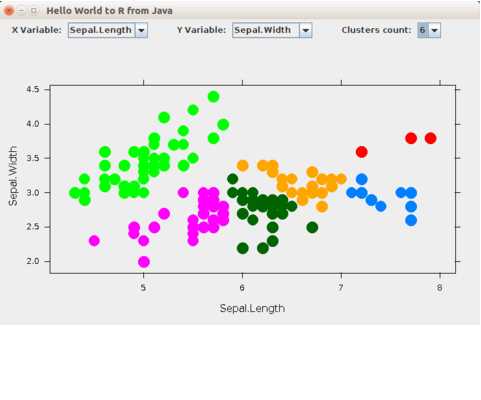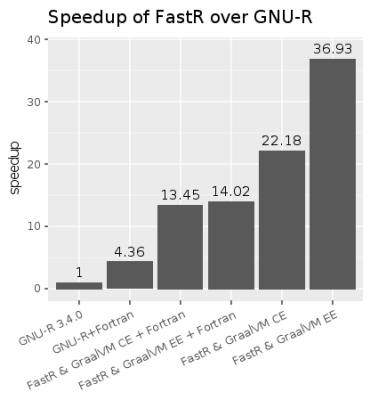FastR is a high-performance implementation of the R programming language, built on GraalVM.
FastR aims to be:
- efficient: executing R language scripts faster than any other R runtime and as fast as
Rcpp - polyglot: allowing fast polyglot interoperability with other languages in the GraalVM ecosystem.
- compatible: with the reference R implementation including the R extensions C API
- embeddable: allowing integration using the R embedding API or the GraalVM polyglot embedding SDK for Java
The screenshot below shows Java application with embedded FastR engine.
The plot below was generated by ggplot2 running on FastR and it shows peak performance of the raytracing example.
The measurements were reproduced independently.
See the documentation on the GraalVM website on how to get GraalVM and install and use FastR.
$JAVA_HOME/bin/R
Type 'q()' to quit R.
> print("Hello R!")
[1] "Hello R!"
>
The goal of FastR is to be a drop-in replacement for GNU-R, the reference implementation of the R language, including the R extensions C API. FastR faithfully implements the R language, and any difference in behavior is considered to be a bug.
FastR can currently install and run basic examples of many of the popular R packages, such as ggplot2, jsonlite, testthat, assertthat, dplyr, knitr, Shiny, Rcpp, quantmod, and more.
However, one should take into account the experimental state of FastR, there can be packages that are not compatible yet, and if you try FastR on a complex R application, it can stumble on those.
If this happens, please submit an issue on GitHub.
To provide better stability, FastR uses by default a fixed snapshot of CRAN (via MRAN).
Function install.packages therefore does not install the latest versions.
This can be overridden by passing repos argument to install.packages pointing to CRAN.
FastR provides its own replacements for rJava and data.table packages, which can be installed with install.fastr.packages(c("rJava", "data.table")).
Packages that use the R extensions C API in hot paths, especially via Rcpp, may exhibit slower performance on FastR due to the high cost of transitions between the native and managed code.
This can be mitigated by using the GraalVm LLVM runtime.
Preview of the support is available via the --R.BackEnd=llvm option.
Note that most of the times FastR running R code equivalent to given Rcpp code is as
fast as GNU-R/Rcpp and sometimes even faster because of the advanced optimizations of the Graal dynamic compiler.
FastR reference documentation which explains its advantages, its current limitations, compatibility, and additional functionality is available on the GraalVM website.
Further documentation, including contributor and developer-oriented information, is in the documentation folder of this repository.
See graalvm.org/community on how to stay connected with the development community. The discussion on Slack is a good way to get in touch with us.
We would like to grow the FastR open-source community to provide a free R implementation atop the Truffle/Graal stack. We encourage contributions, and invite interested developers to join in. Prospective contributors need to sign the Oracle Contributor Agreement (OCA). The access point for contributions, issues and questions about FastR is the GitHub repository.
FastR is developed by Oracle Labs and is based on the GNU-R runtime. It contains contributions by researchers at Purdue University (purdue-fastr), Northeastern University, JKU Linz, TU Dortmund and TU Berlin.
This project welcomes contributions from the community. Before submitting a pull request, please review our contribution guide
Please consult the security guide for our responsible security vulnerability disclosure process
FastR is available under a GPLv3 license.

